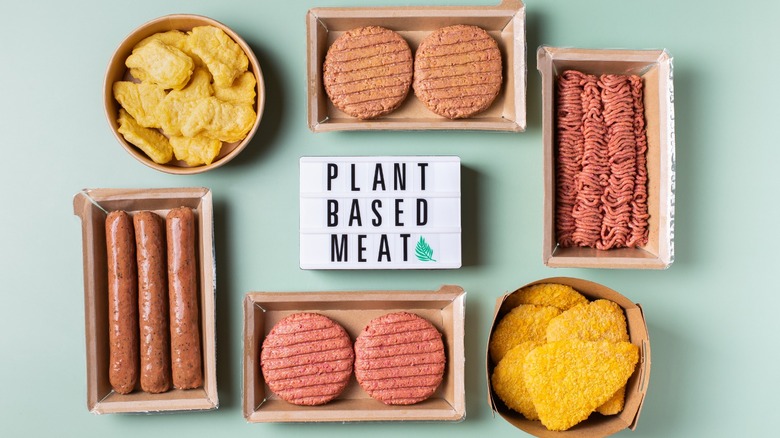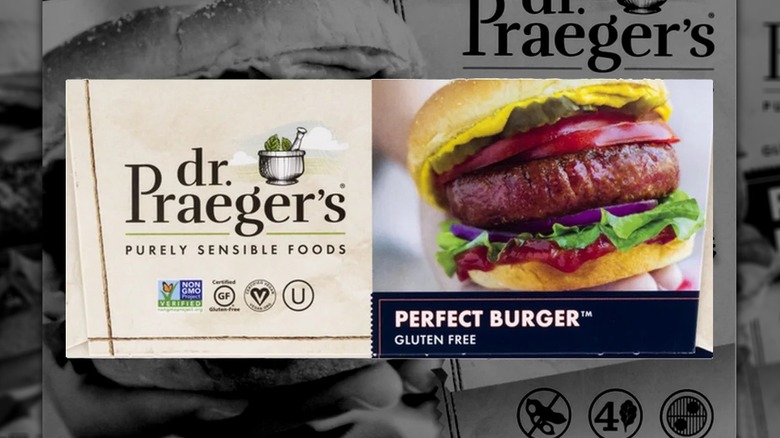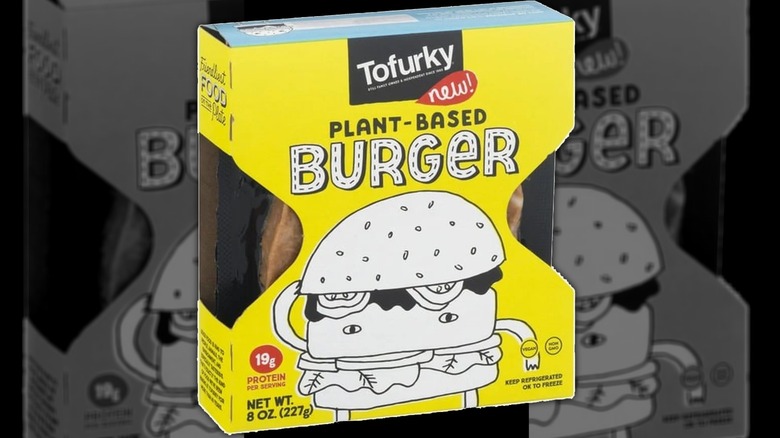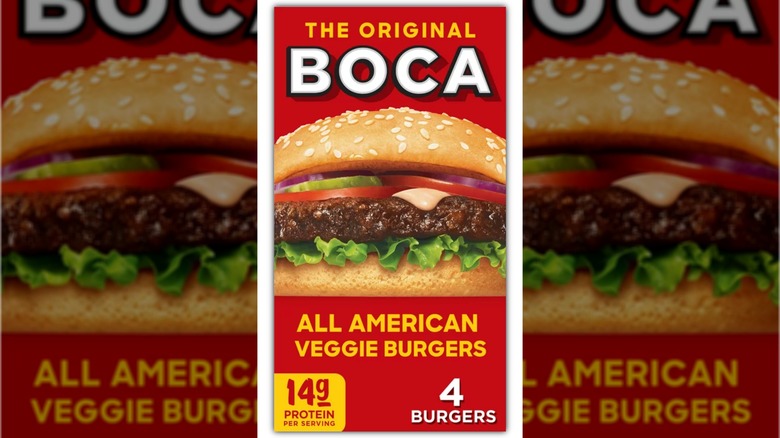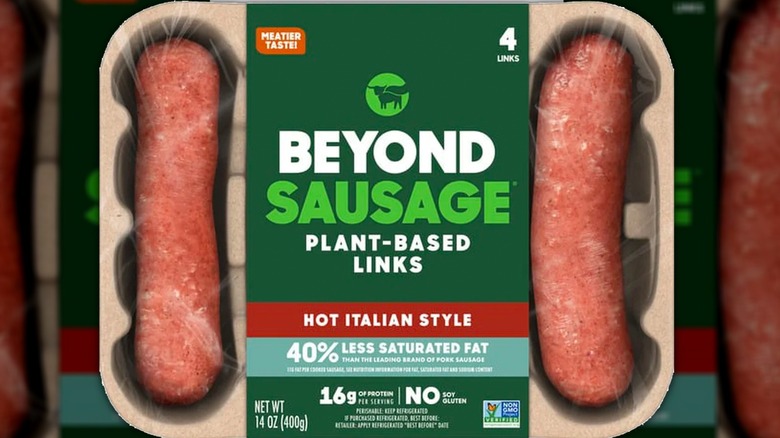11 Of The Unhealthiest Store-Bought Meat Alternatives
People often turn to store-bought meat alternatives driven by environmental concerns, animal welfare, health benefits, or simply a desire for dietary variety. But, are these alternatives always as beneficial as they're perceived to be? While many meat substitutes provide valuable plant-based proteins, typically sourced from soy, peas, or legumes, they frequently come with high sodium levels that can influence blood pressure. Additionally, the incorporation of certain oils increases their fat content, and a few even have surprising amounts of added sugars or carbs that can affect blood sugar levels.
Delving deeper into their composition, some of these products contain ingredients that, while generally safe, may lead to discomfort or other health issues. A prevailing notion suggests that plant-based foods are invariably healthier, but this isn't a blanket truth. Some meat alternatives can rival real meat in salt or fat content. And so, scrutinizing labels becomes imperative for individuals wary of health concerns. As with any dietary item, moderation remains the key when indulging in meat alternatives.
1. Dr. Praeger's Perfect Burger
Dr. Praeger's Perfect Burger presents itself as a meat alternative patty, designed to mimic the texture and taste of traditional meat. At the heart of its appeal is the blend of sweet potato, butternut squash, and carrot, enriching the burger with both flavor and nutrition. Moreover, the patty is both soy-free and gluten-free.
The reason it makes this list, though, is because it contains methyl cellulose. While this ingredient is considered safe in general, according to "xPharm: The Comprehensive Pharmacology Reference," it is a laxative that has potential risks associated with its use in food products. One of the most significant risks is that it can cause digestive issues such as bloating, gas, and diarrhea, according to Medicine Net.
2. Lightlife Smart Tenders Plant Based Chicken
The Lightlife Smart Tenders Plant-Based Chicken is a tempting option for those seeking a great afternoon snack of the meat-alternative variety. Let's address several health concerns. Primarily, its 500 milligrams of sodium per serving (22% daily value) is rather high. Per Harvard T.H. Chan School of Public Health, frequent high sodium consumption can increase the risk of hypertension and stroke.
Although the product offers a seemingly healthy 17 grams of protein per serving, it's vital to assess its source. The soy protein concentrate and isolate present are highly processed, diverging from their original form. While they provide protein, they lack the beneficial nutrients inherent in whole soybeans. Additionally, the ingredients list mentions methylcellulose, which could lead to gas, bloating, and diarrhea.
3. Tofurky Plant-based Burger
The Tofurky Plant-Based Burger, designed to emulate the taste and texture of traditional beef burgers using a blend of soy protein, wheat gluten, and various seasonings, has several downsides, especially when consumed in larger quantities. One of the standout concerns is its high saturated fat content, which is 35% of the daily recommended intake per serving. MedlinePlus notes that a high intake of saturated fats can lead to atherosclerosis, which impedes blood flow and can result in various health complications. Moreover, each patty contains a sodium level that nears ¼ of the daily recommended limit.
Going through the list of ingredients, the main components appear to be soy protein isolate and concentrate, which we know are highly processed, as well as modified cellulose gum. A 2021 study by Benoit Chassaing, Charlene Compher et al. suggests that cellulose changes the gut's microbial composition and interferes with its mucus layer, leading to conditions like inflammatory bowel diseases. It also uses fermented corn sugar, reported byWebMD to be connected to the formation of blood clots, a precursor to medical issues. Also, "natural flavors" are listed, which is unclear as it doesn't specify the exact ingredients.
4. Gardein Ultimate Plant-Based Vegan Burger Patties
Gardein Ultimate Plant-based Vegan Burger Patties are a source of substantial protein at 20 grams per serving. For individuals trying to maintain a balanced diet, several considerations need to be taken into account. First, its saturated fat stands at a high 45% of the daily recommended value per serving. The majority of this is likely coming from coconut oil, a known source of saturated fats. A diet high in saturated fats can increase levels of "bad" cholesterol in the blood, as pointed out by Mayo Clinic, which can increase the risk of heart disease and stroke. Also, the 1 gram of fiber is low for a product that is plant-based and the FDA recommends consuming at a minimum 28 grams of fiber a day to help manage our food intake.
Aside from the macro-nutrient profile, the ingredient list reveals the presence of several processed and synthetic components. For instance, textured pea protein and textured wheat protein suggest they have undergone various processing steps, hence the word "textured", to create a meat-like mouthfeel. They're included for the texture, and not necessarily for the nutrition.
5. Impossible Beef
At first glance, the Impossible Beef may seem like a beneficial alternative to traditional ground beef, especially given its rich vitamin profile and considerable protein content at 19 grams per serving. However, its saturated fat content is high at 30% of the daily value, derived from the use of coconut oil. While we discuss oil, the other oil ingredient to pay attention to is sunflower oil. Considering that burgers are often grilled, pan-seared, or oven-baked, it's crucial to note WebMD's warning that sunflower oil can emit toxic aldehydes at high temperatures, which may increase the risk of cancer.
The ingredients list includes soy leghemoglobin, a lab-created ingredient that gives the product its meaty flavor. While it's currently still in early studies, GMO Science reported that potential adverse effects from leghemoglobin have been found to include changes in blood chemistry, kidney impairment, biological indicators of anemia, and irregularities in reproductive cycles.
6. Field Roast Refrigerated Smoked Apple & Sage Plant-Based Sausages
With a notable 23 grams of protein and only trace amount of saturated fat per piece, Field Roast's Smoked Apple & Sage Plant-Based Sausages might not seem like an unhealthy meat replacement product. And, with carbohydrates at 16 grams its also suitable for those following a low-carb diet. The sodium content is 24% of the daily recommended value, so it's advised to consume in moderation. The sausages also lack dietary fiber, listed as 0 grams, which doesn't help to promote digestive health or provide a sense of fullness.
Moreover, the inclusion of natural smoke flavor raises concerns. Natural smoke flavor is a food additive that is made by condensing wood fumes into a liquid. Liquid smoke contains polycyclic aromatic hydrocarbons that are linked to cancer, as shown by a 1993 study from Enayat A. Gomaa, J. Ian Gray et al.
7. Simulate Dino Nuggs
Simulate Dino Nuggs serve as a plant-based twist on traditional chicken nuggets, a staple often enjoyed during quick snacks, lunches, or casual dinners. Their appeal lies in replicating the familiar taste without using any animal-derived ingredients. However, diving into the nutritional aspects, there's 10 grams of total fat in every serving, which only accounts for 13% of the daily recommended intake, but a significant portion of it comes from soybean oil, which is a highly processed oil known for its high levels of omega-6 fatty acids. While omega-6 is essential for the body, the modern diet often includes too much of it relative to omega-3 fatty acids. According to Inside Tracker, when a large portion omega-6 is taken from refined oil (like soybean oil) it will cause inflammation, a known factor in many chronic diseases.
Additionally, modified food starch has been added to the nuggets. Typically used as a thickener, this ingredient has been reported to potentially cause loose stools, according to a 2001 study by Y Lebenthal-Bendor, R C Theuer, et al. 1,
9. BOCA All American Veggie Burgers
The BOCA All American Veggie Burger offers an alternative for those seeking the classic burger experience without the actual meat. Crafted primarily with soy protein and infused with flavors from garlic, onion, and cheddar cheese, these veggie burgers deliver 14 grams of protein for a mere 110 calories per serving. They are designed for easy preparations like microwaving, or grilling, making them a convenience.
Upon examining the ingredient list, we noticed the inclusion of corn oil, a known source of omega-6 fatty acids that, when consumed in excessive amounts, can induce inflammation. Also present is hydrolyzed vegetable protein; the addition of disodium guanylate and disodium inosinate frequently works alongside similar substances to enhance flavor, and this is reinforced by the mention of "natural flavors," which may signify naturally occurring glutamates. Such a trio of flavor boosters should be approached with caution. According to Allergy Link, potential side effects of these ingredients can range from heart arrhythmia or palpitations to migraine headaches, light-headedness, and mental confusion.
10. Impossible Meatballs
Impossible Foods offers a plant-based twist with their Impossible Meatballs, designed as an alternative to traditional Italian meatballs. Notably, they contain no cholesterol. However, a 85-gram serving packs 3.5 grams of saturated fat and 440 milligrams of sodium. To put this in perspective, traditional meatballs have about 4.9 grams of saturated fat and 478 milligrams of sodium per 100 grams. This narrows the perceived health advantage of opting for a meatless variant. Furthermore, with only 2 grams of fiber, its benefits to digestive health are limited.
Given its nutritional profile and typical pairing with pasta or within a sub, it's best to consider this product as an occasional treat to maintain a balanced diet. This might not be one to add to your regular menu.
12. Beyond Sausage Hot Italian Style
Beyond Sausage offers its Hot Italian-style links as a plant-based alternative to traditional sausages. Made primarily from peas, brown rice, and faba beans, these links pack a protein punch with 16 grams per serving with zero cholesterol. They can be enjoyed in a bun, added to kebabs, used as a pizza topping, or even crumbled into sauces. Despite the good stuff, one 100-gram link contains 530 milligrams of sodium which is 22% daily value. We also found 6 grams of saturated fat (30% daily value), a figure we regret to find, considering that a 75-gram full meat hot link carries about 7 grams.
The product also contains inulin, which according to WebMD, can lead to bloating, cramps, and diarrhea in larger amounts. Plus, there's psyllium fiber, commonly known for its laxative effects. Surprisingly, despite the presence of both inulin and psyllium, the product offers only 2 grams of fiber per link. Seeing both these ingredients on the list does raise a question: Are these sausages meant to be just a tasty treat or are they also designed to aid digestion, albeit with minimal fiber contribution?
13. Gardein Plant Based Mandarin Orange Crispy Chick'n
Gardein's Mandarin Orange Crispy Plant-Based Chick'n offers a meatless twist on a classic Asian-inspired chicken dish. With its golden tempura nuggets and tangy citrus sauce, it's an easy favorite for a quick meal paired with vegetables and rice. However, in the nutritional breakdown, this product stands out most for its sodium and added sugars. One package contains 1,260 milligrams of sodium (55% of the daily value), and 39 grams of added sugars (77% of the daily value). Harvard Health Publishing warns that too much added sugar can increase the risk of many health problems including fatty liver disease and diabetes.
Looking deeper into the ingredients, the prominence of sugar further accentuates concerns. Titanium dioxide, listed as a colorant, has been the subject of scrutiny in the food sector, with the Center for Science in the Public Interest having raised potential DNA-damaging carcinogenic concerns.
